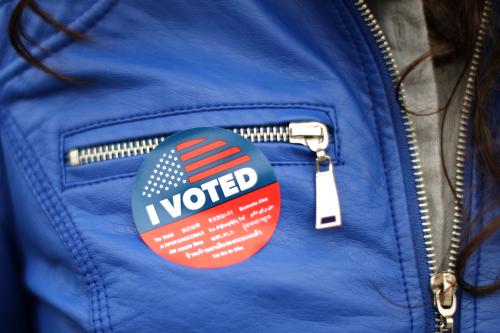This article originally appeared in Real Clear Markets on August 21, 2018.
Losing one’s job is a painful event for anyone, requiring a job-search and potential relocation for new employment. Depending on the circumstances, it may also require acquiring new skills through additional training—an extra cost that’s particularly difficult to cover if you just lost your job. An important new paper from economists at Washington and Lee, the New School, and Duke finds that the stress that results from being unemployed isn’t experienced equally across races, and that losing your job takes a much bigger toll on your mental health if you’re black.
Looking at the psychological effects of unemployment during the Great Recessions, the authors find that short-term (less than 16 weeks) unemployment was associated with a higher level of psychological distress for blacks than for whites. Interestingly, they find little to no statistically significant difference in distress when looking at the effect of long-term unemployment on mental health.
What might account for this difference in unemployment experiences by race? A likely candidate is the difference in wealth by race. A long-term unemployment spell is a major concern for everyone– it is serious and will likely cause significant turmoil and distress in any household. Therefore, it is not surprising that the authors do not find significant differences between races in long-term unemployment spells on mental health measures; everyone is equally worried about their futures.
Losing your job takes a much bigger toll on your mental health if you’re black.
However, a shorter unemployment spell will be of less concern if there is a wealth buffer. Being able to pay the rent, afford utility bills, and keep food on the table are important short-term concerns that can be accommodated if there is ready access to sizeable household assets. In the absence of such resources, even a short-duration unemployment spell can mean great hardship. This research provides suggestive evidence that disparities in wealth may make already bad situations worse; losing one’s job causes significant stress, but the lack of access to a safety net will intensify the psychological distress.
We know from recent research published by the Pew Research Center that white Americans had 10 times the median wealth of black Americans in 2016. The magnitude of this difference in wealth ownership is hard to dismiss. A significant amount of research is starting to accrue explaining how differences in wealth and assets are a significant obstacle to the long-run economic success and general well-being. Differences in wealth explain differences in college attendance, and wealth is an important determinant of small-business start-up capital and success. Researchers have also shown that poverty impairs decision-making, reducing an individual’s test scores, and that there are real-world consequences of being poor both in potential performance measures as well as in health outcomes. One’s mental “bandwidth” can only focus on a fixed-number of items—financial concerns can crowd out other productivity-enhancing activities.
In terms of income flow, there are large disparities across race and ethnic groups. In recent research of my own, conducted with co-authors at the Census Bureau, I show that income accrues disproportionately to whites at the top 10 percent and 1 percent of the income distribution using U.S. Census and IRS data. This suggests that not only are the rich getting richer over time (more income flows to the top income percentiles than to the bottom percentiles), but that these differences are diverging further by race groups. Differential and sustained income flows will necessarily cause divergence in wealth creation over time.
There are significant costs to wealth inequality. We have known for some time that it serves as an obstacle to important investment decisions in education and entrepreneurship. Now, we’re finding evidence that it may have adverse effects on individual well-being and mental health in the face of short-term unemployment.
Programs aimed at increasing wealth and asset accumulation for the poor would be an important solution to these problems. Advocates have discussed reparations, home ownership programs, universal basic income, baby bonds, and individual development accounts. Some of these programs are aimed at specific races and others are targeted to the poor of all races. If successfully implemented, these programs would increase the asset buffer for communities of color.






Commentary
Op-edNew evidence that losing your job is even more stressful for black Americans
August 21, 2018